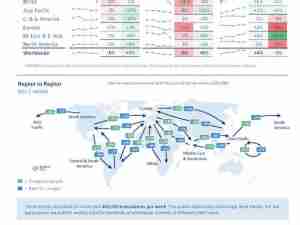Airbus SE Chief Executive Officer Tom Enders slammed Brexit and U.S. President Donald Trump’s pro-America trade policies as presenting twin threats to its business, while singling out the U.K.’s vote to leave the European Union as posing the bigger issue.
The developments amount to a “double whammy” of protectionist hazards, Enders said in London at the annual dinner of the ADS trade association, which represents more than 1,000 aerospace, defense, security and space companies.
Brexit will weaken British industry and aerospace manufacturing in particular by increasing costs and curtailing competitiveness, the CEO said late Monday. While Airbus will seek to mitigate the impact on its business, “whatever we can do, the net result I’m afraid will be negative,” he said.
The Toulouse, France-based company has 25 sites in the U.K., including its main wing design and production facilities, while the wider supply chain extends to 672 sites and more than 5,000 “links or relations” in commercial aviation alone, Enders said.
Though Airbus should be protected from tariffs by an exemption granted to aerospace under World Trade Organization rules, it desperately requires clarity in areas such as future customs procedures and the movement of employees, according to the executive, who said employees make 80,000 business trips a year between the U.K. and other EU states.
ADS President Colin Smith, a former head of government and regulatory affairs at Rolls-Royce Holdings Plc, used the event to call on Britain and the EU to negotiate a transition period for Brexit of not less than two years during which the status quo for businesses would prevail.
‘Ruthless’ Boeing
Under Trump, the U.S. is “no longer fighting for opening markets but to close the U.S. market to foreign companies and foreign competitors,” with arch-rival Boeing Co. a direct beneficiary, Enders said.
Boeing is “ruthlessly surfing on this ‘America-first’ wave,” he said, citing the import duties imposed on the C Series jet built by Montreal-based Bombardier Inc. following complaints from the U.S. company that the model had benefited from illegal state aid.
Labeling the levy to be imposed on U.S. carriers that buy the Canadian plane—in which Airbus has acquired a controlling stake—as “predatory” and “bullying,” Enders said that the move may bring short-term success but will ultimately be self-defeating, adding: “You don’t attack customers.”
Still, “the wreckage that President Trump will leave after four or eight years in the White House might be easier to repair than the U.K. exit from European Union,” he said.
The CEO added in a statement Tuesday that his remarks were meant to show that U.S. airlines would be best served through competition between “healthy and balanced” planemakers, rather than with Boeing as the dominant supplier.
Airbus earlier revealed that it secured 1,109 jet orders last year, 52 percent more than in 2016, marking its sixth straight annual sales victory over Boeing. Commercial unit chief Fabrice Bregier said the trend means the European company should overhaul its competitor’s lead in aircraft deliveries by 2020.
The tally could reach 800 this year, Enders said, more than the 763 Boeing handed over in 2017, though the U.S. group is also accelerating output.






